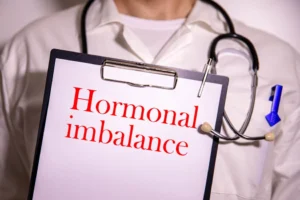Psychosis is a mental health condition depicted by a disconnection from reality, leading to hallucinations, delusions, and impaired cognitive functioning. It affects many individuals worldwide, and there has been speculation regarding the production of neurotoxins during psychotic episodes. This blog will explore the truth behind the claim and illuminate the current scientific understanding of neurotoxins and psychosis.
Understanding Psychosis
Psychosis is a complex mental health condition involving various symptoms and experiences. Individuals with psychosis may exhibit hallucinations, seeing or hearing things that aren’t there, and delusions, firmly held ideas that are not based on reality. Other symptoms may include disorganized thinking, speech disturbances, and social withdrawal. Psychosis can be a primary condition or symptom of other underlying mental health disorders such as schizophrenia, bipolar disorder, or severe depression.
The causes of psychosis are multifaceted and involve a combination of genetic prejudice and environmental factors. While the exact mechanisms are not thoroughly understood, research suggests that disruptions in neurotransmitter systems, particularly dopamine and glutamate, play a role in the development of psychosis. Brain structure and connectivity abnormalities have also been observed in individuals with psychosis.
Neurotoxins: Definition and Effects
Neurotoxins are substances that have the potential to damage or destroy neurons, which are the building blocks of the nervous system. These toxic substances can interfere with the normal functioning of neurons and disrupt the communication between brain cells. Examples of neurotoxins include heavy metals like lead and mercury, certain pesticides, industrial chemicals, and some drugs.
The effects of neurotoxins on the brain may vary on the specific substance and the dose. They can lead to various neurological symptoms, such as cognitive impairment, memory problems, motor dysfunction, and sensory disturbances. Severe exposure to neurotoxins can even result in long-term neurological disorders.
Neurobiology of Psychosis
To understand the relationship between neurotoxins and psychosis, it is essential to delve into the neurobiology of psychosis itself. Research has identified several biological factors that contribute to the development of psychosis, including alterations in neurotransmitter systems, brain structure, and connectivity.
Dopamine dysregulation hypothesis: The dopamine hypothesis proposes that excessive dopamine activity in specific brain regions, such as the mesolimbic pathway, contributes to the positive symptoms of psychosis, such as hallucinations and delusions. It is crucial to remember that this hypothesis does not involve the production or involvement of neurotoxins.
Glutamate hypothesis: Another neurotransmitter implicated in psychosis is glutamate. Research suggests that disturbances in glutamate signaling, particularly involving the N-methyl-D-aspartate (NMDA) receptor, may contribute to the negative signs and cognitive impairments observed in psychosis.
Structural and connectivity abnormalities: Neuroimaging studies have revealed structural distinctions in the brains of individuals with psychosis compared to those without. These differences include reduced gray matter volume, altered cortical thickness, and disrupted connectivity between brain regions. However, these abnormalities are not indicative of neurotoxin production.
Debunking the Myth: Neurotoxins and Psychosis
Contrary to popular belief, no scientific proof supports the claim that neurotoxins are produced during psychosis. Extensive research has been executed to explore the biological markers and mechanisms of psychosis, and neurotoxins have not been identified as a contributing factor.
Studies have instead focused on other factors that may contribute to the development of psychosis. For example, inflammation and oxidative stress have been investigated as potential mechanisms underlying psychosis. While these processes may have neurotoxic effects, they are not synonymous with neurotoxin production.
Inflammation and psychosis: Some studies have found evidence of increased inflammation in individuals with psychosis. Inflammatory markers, such as cytokines, have elevated the blood and cerebrospinal fluid of individuals experiencing psychotic episodes. However, it is essential to note that inflammation is a complex immune response and does not involve the direct production of neurotoxins.
Oxidative stress and psychosis: Oxidative stress refers to an imbalance between the production of reactive oxygen species and the body’s ability to balance them with antioxidants. Some research suggests that individuals with psychosis may experience increased oxidative stress, potentially damaging cells and contributing to neurodegeneration. However, oxidative stress does not involve the production of neurotoxins.
Furthermore, extensive studies examining the biological markers of psychosis, such as brain imaging and genetic analyses, have not revealed the presence of neurotoxins. Instead, the focus has been on understanding the intricate interplay of genetic predisposition, environmental factors, and alterations in neurotransmitter systems.
Factors Contributing to Psychosis
While neurotoxins may not be responsible for psychosis, several other factors contribute to its development. These factors include:
- Genetic predisposition: Research has shown that certain genetic variations can increase the risk of developing psychosis. However, genetics alone do not determine whether an individual will develop the condition. Environmental factors often interact with genetic susceptibility to trigger the onset of psychosis.
- Environmental stressors: High-stress levels, trauma, and adverse life events increase the risk of developing psychosis. These stressors can disrupt the delicate balance of neurotransmitters and contribute to the manifestation of symptoms.
- Substance abuse: Substance abuse, particularly psychoactive substances like cannabis and hallucinogens, has been linked to the onset of psychosis. These substances can alter brain chemistry and increase the likelihood of experiencing psychotic symptoms.
- Hormonal imbalances: Fluctuations in hormone levels, such as those that occur during puberty, pregnancy, or hormonal disorders, may influence the development of psychosis. Hormones can affect neurotransmitter activity and modulate brain function, potentially contributing to the onset of symptoms.
Treatment and Management of Psychosis
While the myth of neurotoxin production during psychosis has been debunked, focusing on evidence-based treatment and management strategies remains crucial. The treatment aims to reduce the symptoms, improve the quality of life, and promote recovery. Approaches may include:
- Medication: Antipsychotic medications are commonly prescribed to manage psychotic symptoms. These medications work by targeting neurotransmitter imbalances, particularly dopamine and sometimes glutamate. However, medication selection and dosage should be tailored to each individual’s needs.
- Psychotherapy: Psychotherapy, such as cognitive-behavioral therapy (CBT), can help individuals with psychosis develop coping strategies, manage symptoms, and improve their overall well-being. It can also address underlying psychological issues and help individuals reintegrate into their communities.
- Social support: Building a solid support network is crucial for individuals with psychosis. Family support, peer support groups, and community services can provide valuable assistance and understanding.
- Early intervention: Early identification and intervention are essential for better outcomes in psychosis. Prompt treatment initiation can help prevent further deterioration and reduce the impact of symptoms on an individual’s life.
Future Directions in Psychosis Research
While the myth of neurotoxin production during psychosis has been dispelled, ongoing research continues to deepen our understanding of the condition and its underlying mechanisms. Future directions in psychosis research include:
- Neuroplasticity: Investigating the brain’s ability to reorganize and adapt could shed light on potential interventions that promote recovery and improve outcomes for individuals with psychosis. Understanding how the brain can remodel itself may lead to innovative therapeutic approaches.
- Immune system involvement: Research suggests that the immune system may play a role in developing psychosis. Further exploring the relationship between immune dysregulation and psychosis could uncover novel treatment targets.
- Personalized medicine: Advances in genetics and neuroimaging techniques offer the potential for customized approaches to treatment. Tailoring interventions based on an individual’s unique genetic makeup and brain characteristics may optimize treatment outcomes.
- Psychosocial interventions: Investigating the efficacy of psychosocial interventions, such as social skills training, vocational rehabilitation, and supported education, can enhance our understanding of non-pharmacological approaches to managing psychosis and improving functional outcomes.
Conclusion
In conclusion, it is essential to dispel the myth that neurotoxins are produced during psychosis. Extensive scientific research has shown no evidence supporting this claim. The neurobiology of psychosis involves complex interactions of genetic and environmental factors, neurotransmitter imbalances, and structural abnormalities in the brain.
However, regarding other uses of neurotoxins, such as for cosmetic purposes, A Better Solution Wellness Clinic offers safe and effective options. Their specialized team of medical professionals provides neurotoxin treatments that can address various concerns, such as reducing wrinkles and fine lines. With their expertise and commitment to client well-being, A Better Solution Wellness Clinic offers a trusted and reliable solution for those seeking neurotoxin treatments.
Remember, while neurotoxins may have their applications in specific contexts, they are not produced during psychosis. It is essential to rely on accurate scientific information and seek reputable professionals for treatment decisions.






